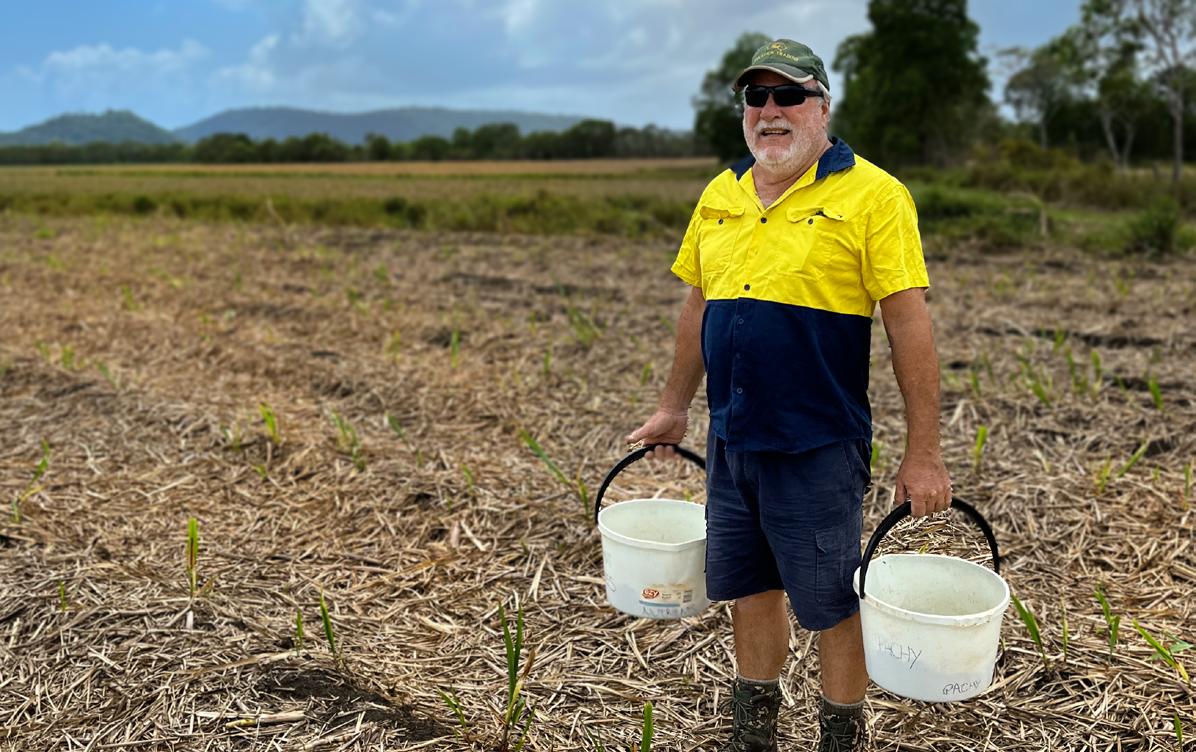
4 minute read
PRIORITISING PRODUCTIVITY
By Renee Cluff
Traditionally, Great Barrier Reef water quality projects have been focused on nitrogen applications. Growers are now embracing a new program which has turned that model on its head.
Advertisement
For almost 15 years, Innisfail District sugarcane grower Alan Colgrave has been involved in water quality projects that concentrated on efforts to reduce fertiliser inputs and modify how nitrogen is applied and filtered. With considerable gains made in decreasing Dissolved Inorganic Nitrogen (DIN) runoff in the region, there is now a recognition that further nitrogen reduction is limited or minimal.
The latest water quality project, which straddles both the Johnstone and Tully catchments, is instead focused on overall plant health. Cassowary Coast Reef Smart Farming, funded by the partnership between the Australian Government’s Reef Trust and the Great Barrier Reef Foundation, is aimed at increasing nutrient uptake, thereby reducing the possibility of unused nitrogen entering waterways. Alan is delighted to be involved.
“As a grower we have been somewhat under pressure,” he explained. “Everything was about limiting our nitrogen inputs on farm. Every message we got from government was always about stifling the amount of nitrogen a grower could use on his crop. Over time, that took a lot of onus off overall soil health. We lost focus on the basics of how to grow a good crop, that being a balanced nutrition program rather than being focused on one element.
“For a long time, we have not thought about our soil as a dynamic medium to grow a crop in, it’s always been about nitrogen and therefore our productivity has been reducing. Once you go back to growing a good and healthy crop with the right nutrient inputs, you’ll be utilising those nutrients rather than them potentially moving offsite.
CANEGROWERS Innisfail is coordinating the program, which includes both the sugarcane and banana industries on the Cassowary Coast.
It’s a region identified by the Reef 2050 Water Quality Improvement Plan as a high priority for the reduction of end-of catchment anthropogenic loads of DIN.
Project leader Deb Telford said improving Nitrogen Use Efficiency (NUE) without compromising farm productivity is the project’s main goal.
“That will then keep nitrogen on the land and decrease the amount of DIN in our catchments.” The work is driven by key constraints associated with DIN losses and reduced productivity as identified by the South Johnstone Local Expert Analysis group, which is a cohort of local researchers, growers, industry stakeholders and agronomists established by Sugar Research Australia.
Targeted extension support is providing risk profiles for root rotting disease Pachymetra, identifying nutritional deficiencies in the soil of older ratoons and developing plans for transitions to new cane varieties.
In the banana industry, tailored, holistic nutrient management plans are being developed for 30 growers through a partnership with the Australian Banana Growers Council (ABGC).
The program is not a onesize-fits-all approach, which again differs from previous water quality projects.
Deb said enduring practice change will be achieved through sustainable, tailored, co-designed management strategies that are supported by skilled extension staff and owned by each enterprise.
“This is an extension project tailored to meet the needs of each participating enterprise,” she said.
“Past water quality initiatives have relied on a prescriptive course of action, often overlooking key differences between farms and the people that manage them.
“This project is working very closely with growers to evaluate their physical, economic and socio-cultural drivers and tailor a plan that works for them while delivering the best possible environmental outcomes.”
Grower Alan Colgrave said designing plans to suit individual operations will likely achieve higher rates of adoption.
“All growers are individuals and we have independent thoughts and we seek to make our own decisions,” he said.
“When we are treated as one entity - one mould fits all - we all look at it as being foreign to our own ways of doing things. Our operations differ, from soil types, to labour, to the machinery we use. A personalised approach is always going to lead to greater adoption when it comes to new ways of doing things.”
More than 80 cane growers are taking part in the project, and the water quality objectives include an overall reduction of more than 60-tonnes of DIN. Sugar Research Australia, CANEGROWERS Tully, behavioural science organisation Evidn and University of Southern Queensland Professor Bernard Schroeder are also involved in the program, which is scheduled for completion in June 2024.

Debra Telford addresses growers at a shed meeting










